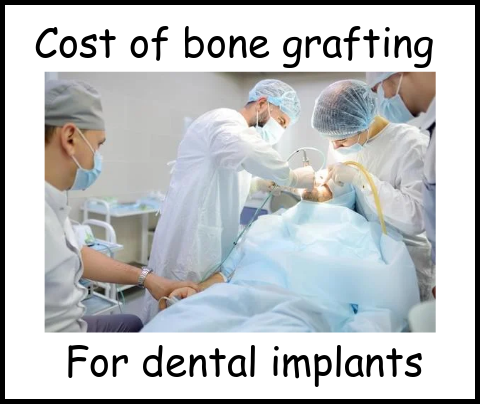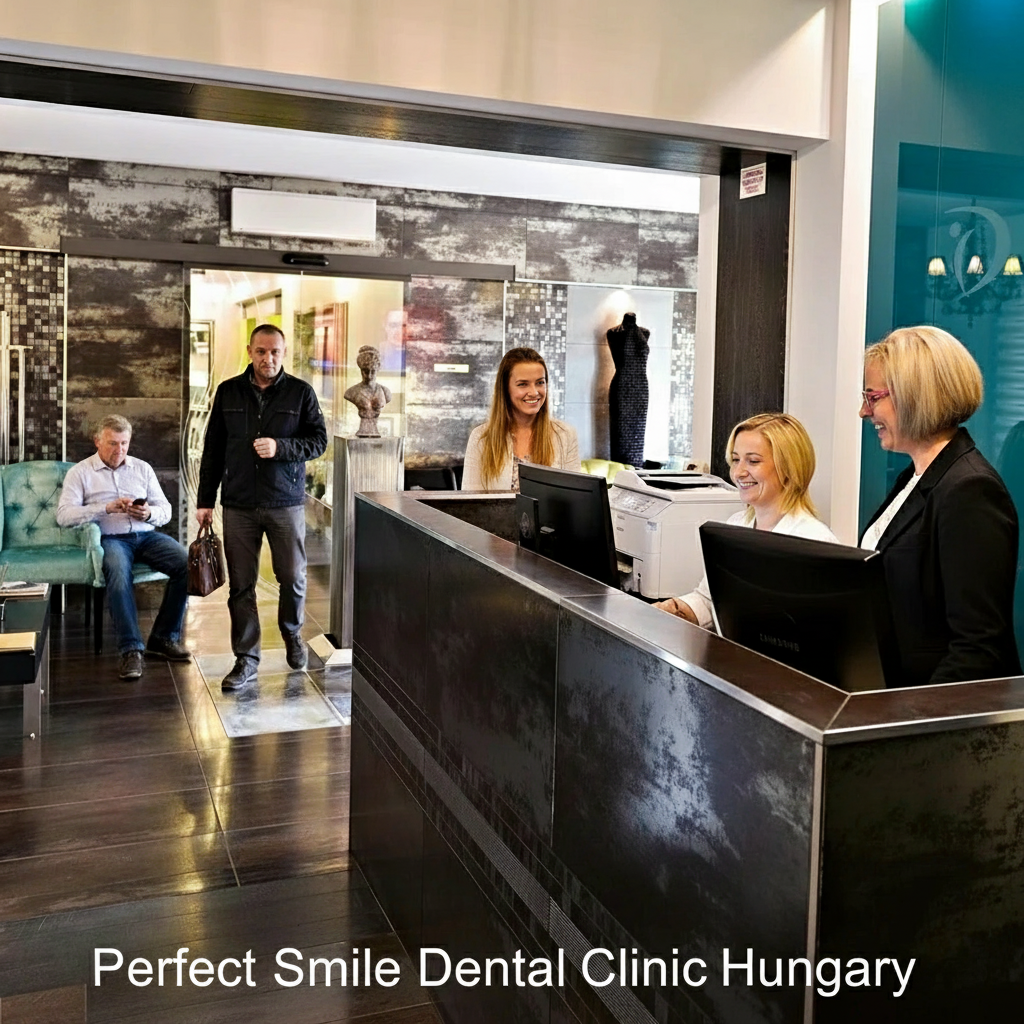The cost of bone grafting for dental implants in Ireland start at €450 for a small socket graft and up to €2,000 for a large bone graft.
This figure is before you add on the cost of a dental implant, the cost of bone grafting ads considerably to the overall cost of dental implants.
Were you aware that bone grafting in Perfect Smile Dental Clinic in Hungary costs just €150, dental implants cost just €549, so overall treatment will be much less expensive in Hungary.
Call Fintan anytime on 0873490104 for more details on the cost of bone grafting for implants in Hungary with aftercare in Hungarian Dentists Wexford.
A single dental implant in a dental clinic in Ireland would cost a minimum of €1,350.
That price includes the implant, abutment and crown.
If bone grafting is part of your treatment the cost of bone grafting for dental implants could be as much as €3,350 for just one bone graft and one implant.

Bone grafting for dental implants in Hungary
I just want to make you aware of the cost of bone grafting for dental implants in our state-of-the-art dental clinic Perfect Smile Dental Implant Centre Hungary.
The cost of treatment is a lot less in Perfect Smile Hungary, for example a bone graft is priced at €150-€250.
Whilst a dental implant, abutment and crown costs €550.
All of these treatments are carried out by our professional staff in Hungary.
Patients from Ireland return to Hungarian Dentists in Wexford where our dentists provide aftercare and regular check-ups.
If the cost of bone grafting for dental implants is preventing you from getting the treatment why not consider your options.
Call Fintan at Hungarian Dentists Wexford for a free xray and bone graft for dental implants consultation.
We will provide a detailed dental plan based on your needs.
Find out what the cost difference is between having the treatment in Ireland against having the treatment in Hungary.
You may be surprised at the savings.
What does the cost of bone grafting depend on
The cost of bone grafting for an implant depends on three things.
The size of the procedure, the difficulty, and the type of material that is used.
In Ireland prices range from €450-€2,000, in Hungary the cost range from €150-€250.
Patients often ask, where does the new bone come from.
The cost does depend on the source, ie, if the dental surgeon uses bone sourced from the patient’s body the cost will be less.
If bone from outside that is purchased from a supplier is used the cost tends to be that bit higher.
However the time to do the bone graft will be less.
To find out more about cost of bone grafting for dental implants in Perfect Smile Dental Implant Centre Hungary.
Why not call Fintan the local Irish coordinator for a chat.
More about bone grafting dental implants
How do you find out that you have bone loss in your gums.?
None loss in the gums is usually found when a dental xray or cat scan has shown that there is a thin jawline due to a loss of bone.
The amount of bone grafting to be done will be in proportion to the number of dental implants that are required.
In some cases, a patient may need to consider bone grafting for aesthetic appeal, where several teeth are lost.
The appearance of the jawline and face looks sunken if dental implants are not used as a replacement for missing teeth.
This sunken appearance can be changed with the addition of bone grafting and dental implants.

Bone loss causes
When teeth are healthy they naturally maintain the density of the bone by a renewal process that ensures bone growth is normal and tooth tissue thrives.
On the other hand, missing or unhealthy teeth will over time trigger bone loss.
Bone loss in the jaw causes are many, the natural aging process does weaken the bone
Wearing dentures for a long time doesn’t help, and missing teeth.
Infection and periodontitis (gum disease) injury or accident can all lead to recession in the area that surrounds a missing tooth and the jawbone will shrink.
To find out more about cost of bone grafting for dental implants in Perfect Smile Dental Implant Centre Hungary.
Why not call Fintan the local Irish coordinator for a chat.
What types of bone grafting are available
There are four types of bone grafting for dental implants that include:
- Alloplastic
- Allografts
- Autogenous/Autografts
- Xenografts
Alloplastic
These are quite unique in terms of bone grafting, they are made by hand and do not require a donation of natural bone.
Basically an alloplastic bone graft is synthetic derived from calcium phosphate and absolutely the same in appearance.
There are two types available, resorbable and one that isn’t resorbable.
The first one graft will over time be replaced by your bodies own natural bone.
The resorbable bone graft will stay intact and not be affected by the growth of natural bone.
In the two cases, the grafting will provide a strong base from where dental implants can be fitted.
Allografts
Allografts are used where a human donor will provide natural bone.
This isnt the case where bone is taken from the patient’s body, the bone donation comes from a dedicated bone bank.
Think about it in terms of a dedicated blood bank.
These samples of human bone are sourced from willing individuals.
The samples are rigorously sterilized and checked before they can be used for bone grafting.
When the procedure has concluded the new bone will be accepted by your body and integrate naturally into the jawbone.
Autogenous/Autografts
Autogenous/Autografts are created when a sample if bone is taken from another part of the patient’s body.
Ideally from the hip bone where there are high marrow levels, marrow provides an abundance of bone cells
The cells are taken and grafted onto the jawbone.
In terms of successful bone grafting, Autogenous/Autografts are right up there.
However this technique is only suitable in cases where the patient has lost a significant piece of the jawbone.
The grafting treatment is rather complex, the surgeon is required to take out donor cells in addition to grafting the bone.
Xenografts
A Xenograft is a little bit the same as an Allograft.
The main difference is that the donation of bone icomes from an animal source.
The Xenograft standard source is taken from a cow (bovine).
No safety issues
We completely understand when some patients feel a little bit uncomfortable about bone from a cow being used.
In the great scheme of things there are no safety issues.
The same testing and sterilization techniques are used to make sure the composition of the bone is compatible with the patient’s bone.
The Xenograft form of bone grafting acts as a stimulant and creates a response from the human body.
It is known as “Osteoinduction”
Over a period of time the patient’s body will make new bone that replaces the Xenograft bone by the usage of a certain protein known as Bone Morphogenic Protein.

Can new bone be rejected
In the vast majority of cases bone grafting for dental implants are very successful.
However as with any surgical treatment there is a tiny risk that the body will reject the new bone.
The dental profession have tried hard to come up with answers as to why this happens.
No definitive answer has emerged. However, its thought that medical conditions and smoking do contribute to the overall risk.
Should a bone graft be rejected, it will need to be surgically removed.
A period of healing will take place before a new bone graft can be placed.
I’m cases where bone grafting isn’t an option, a number of other treatments are available to help with bone loss.
They include a sinus lift, a ridge expansion, or distraction osteogenesis.
To find out more about cost of bone grafting for dental implants in Perfect Smile Dental Implant Centre Hungary why not call Fintan the local Irish coordinator for a chat.
Conclusion
I would like to think that this article on the cost of none grafting for dental implants has revealed more information for you especially how you can save money on bone grafting for dental implants.
Our experienced Hungarian dentists will be able to determine which is the right choice of bone grafting type for you, to find out more give Fintan a call.
Bone grafting when done professionally is very effective, most cases are successful and do help a lot to regrow lost jawbone.
When the jaw is stronger our Hungarian dentists in Perfect Smile can get to work to restore your smile.
Dental implants vs bridges read more.
References
https://www.ncbi.nlm.nih.gov/pmc/articles/PMC5601489
https://pubmed.ncbi.nlm.nih.gov/34369720
Aftercare & Check-Ups in Wexford FREE CONSULTATION

